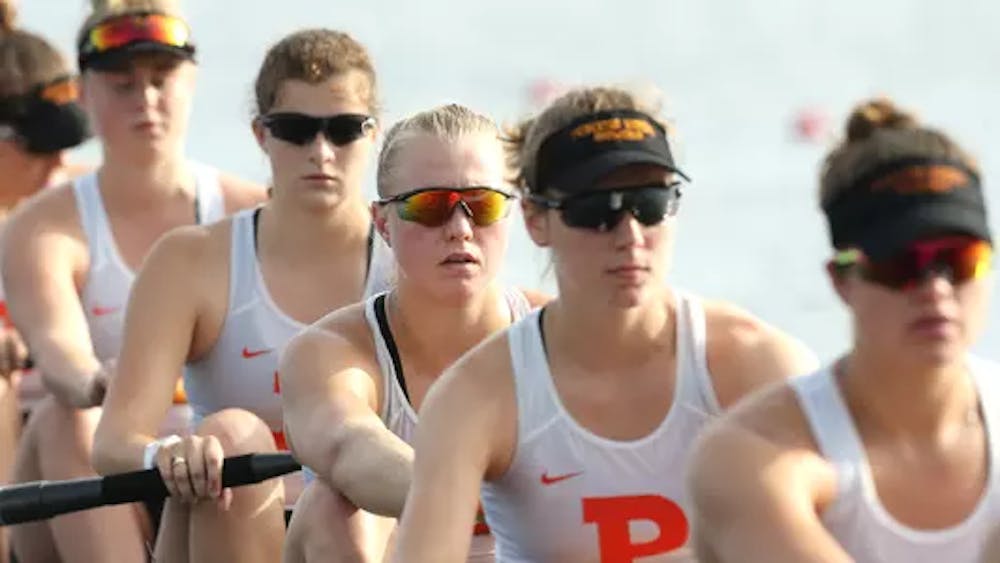Princeton Rowing has certainly left its mark on the City of Lights, with program alumni securing three medals to close out the sport’s Olympic run.
Nick Mead ’17 and Hannah Scott ’21 brought home gold for Team USA and Great Britain, respectively, while Tom George ’18 also won a silver for Great Britain.
Mead and his three boatmates secured Team USA’s first gold medal in the men’s four in over 60 years, after a strong first-place finish in their heat.
Men’s four is a race where each athlete has only one oar, with the rowers alternating strokes (called sweep rowing). The Olympics has three sweep rowing events: doubles, fours, and eights. Eights is the only event with a coxswain, meaning it was up to Mead and the other three rowers to guide the boat.
Mead, who sits out the bow, played a key role in the team’s communication, and resulting win.
The Americans jumped out to a quick lead but were neck and neck with the New Zealand team after the first 500 meters. With around 600 meters left, the Kiwis started gaining slightly on the Americans, however Mead, and Olympic teammates Liam Corrigan, Michael Grady, and Justin Best, revved up their stroke rate and maintained their edge.
Team USA’s boat managed to pull ahead, edging out the silver medal Kiwis by just 0.85 seconds in the 2000-meter race, rowing a time of 5:49.03.
The foursome are all former NCAA rowers, representing Princeton, Harvard, Cornell, and Drexel, respectively. Collegiate rivalries were put aside in a rousing victory for Team USA rowing — helping to return glory to the program, which did not medal once at the 2020 Tokyo Games.

Team USA surges past New Zealand for GOLD in men's four rowing! 🇺🇸🔥 #ParisOlympics pic.twitter.com/tCQm7Rk52z
— NBC Olympics & Paralympics (@NBCOlympics) August 1, 2024
Meanwhile, Scott and her boatmates emerged victorious after a tight and tense battle for gold against the Dutch team in the women’s quad sculls. After trailing the boat from the Netherlands throughout the race, the British boat nosed ahead to win by just 0.15 seconds.
Like men’s four, quad sculls has four rowers, but each rower has two oars — different from the sweep rowing of Mead, and Princeton’s own rowing program.
The British trailed by over five meters with 120 meters to row, but they found an incredible gear with seconds left to outsprint the Dutch. The close finish required a photo review by event officials, which confirmed the British victory. Upon receiving confirmation, the British boat exploded in celebration.

A time of 6:16.31 delivered Scott and her boat a trip to the top of the podium at the Vaires-sur-Marne Nautical Stadium, roughly 40 kilometers outside from the Olympic Village. The gold medal marks a major comeback for the British women in an event they finished seventh in at Tokyo three years ago.
Scott’s gold medal was the 34th all-time for a Princeton athlete, and just the fifth ever for a Princeton rower, until Mead added to the count the next day.
George — who graduated a year after Mead and rowed in the same heavyweight roster at Princeton — added to Great Britain’s rowing medal stack with a silver in the men’s pair, a sweep-rowing race featuring just two rowers.
While the British duo led for a significant portion of the 2000-meter race, a furious finish from the Croatian brothers Valent and Martin Sinković in the final 50 meters proved to be the deciding factor in the race. The Croatian boat was in fifth place after the first 500 meters but engaged in an effective chase, and won by another narrow 0.45 seconds over Great Britain.
The Sinković brothers defended their Tokyo gold in the same race, but George managed to grab his second ever Olympic medal after his bronze in the men’s eight at Tokyo — another medal he shares with his Yale-alum rowing partner Oliver Wynne-Griffith.
George has become just the second male rower from Princeton to win multiple Olympic medals, following in the footsteps of Doug Burden ’88, who earned a silver in the men’s four at the 1992 Barcelona Olympics and a bronze in the men’s eight at the 1988 Seoul Olympics.
Princeton Rowing competed in their first ever meet in 1872 in Philadelphia, and has continued to excel as one the nation’s premier collegiate rowing programs. Mead, Scott, and George successfully carried their Tiger training from Lake Carnegie to the outskirts of Paris, and secured more hardware for the Orange and Black in this year’s Games.
Harrison Blank is an assistant Sports editor at the ‘Prince.’
Please send any corrections to corrections[at]dailyprincetonian.com.








